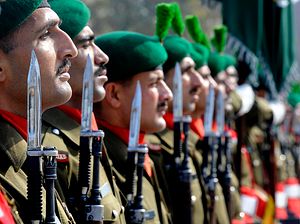The recent judgment by the Special Court on the former military dictator Pervez Musharraf has stirred up a heated debate wherein the whole discussion is centered around a single question: can a military officer be a traitor? Both the ruling government and the military are understandably not pleased with the decision, whereas a small section of society (including opposition parties) has welcomed the court’s ruling, calling it “historic” and “symbolic.” Indeed, it does not matter if Musharraf receives the death sentence; what matters is that justice has been served.
However, I contend the significance of this decision goes beyond symbolism. It is challenging the meta-narrative that has been undermining civilian supremacy in Pakistan. In other words, the ruling has criminalized the military’s tutelary politics.
Aqil Shah in his phenomenal book, The Army and Democracy, has traced the evolution of the Pakistan military from a border-patrolling force to a state-controlling institution. Like any other military, the Pakistan army was mandated to protect the country’s borders from external enemies. From 1958 onwards, the military became institutionally strong by securing more resources, cashing in on and exploiting the Indian threat.
The continued unrest in East Pakistan over the underrepresentation of the majority Bengalis alarmed then-military dictator Ayub Khan, and he decided to expand the military’s role to safeguard the country from rising provincialism and national security issues. That was the beginning of the military’s tutelary intervention.
The military’s sense of guardianship also brought its interpretation of what it means to be an “ideal” society. Ayub Khan found “flaws” in a parliamentary democracy, so he introduced his version of democracy, i.e. party-less democracy. This partly aimed to counter the growing influence of left-leaning parties, but more importantly, it helped the military maintain its tutelage by keeping a check on political actors. This process cemented the military’s superiority over civilians.
For instance, after the fall of Dhaka in 1971, then-President (and later Prime Minister) Zulfiqar Ali Bhutto took some drastic measures. He blamed the military for the East Pakistan debacle, supervised officers’ promotions, and strictly tried to discipline the attitude of generals toward civilians. But despite the 1971 defeat and Bhutto’s aggressive approach, the bigger question remains: how did the military manage to regain its power in the 1977 coup, at a time when it was undergoing immense humiliation? Shah opines that the reason why the military rose again in such a short period was the embedded perception within the institution that civilians are incapable of ruling. Therefore, despite Bhutto’s efforts to discipline the military, the latter had never “internalized that subordination to the civilian authorities was inviolable principle.”
The politicization of the military under Zia ul Haq was the most detrimental. It completely changed the outlook of the institution. In Ayub and Yahya Khan’s eras, the military was perceived as a guardian of the state, or the last refuge, when civilians fail to confront internal or external challenges. As Shah argues, Zia expanded the military’s scope. Now the military was not only the guardian but was also institutionally prepared to govern the state, such as by instituting the military’s high command to learn the art of governing, its expansion into civil society, and institutionalizing the military’s commercial activities.
Situating the tutelage of the military in this debate, the current judgement challenges the 60-year-old institutional development of the military institution as the guardian of the country, in which it self-appoints to thwart both external and internal challenges even if it has to suspend the constitution. The main emphasis of the press release issued by the Inter-Services Public Relations (ISPR) December 17, in response to the court’s ruling, is that Musharraf “can surely never be a traitor.” The press release did not question the death penalty. The fact is the military cannot afford to have any of its activities labelled as an act of treason. The notion that the military men could also be traitors has never been part of the collective imagination; this dubious (dis)honor was only restricted to civilians until now.
In addition, calling an ex-military chief a traitor not only means challenging the guardian role of the military, but it also means criminalizing the tutelary mindset within the military. As Shah highlights in his book, it is part of the military mindset that civilians are incapable of governing, and it is the responsibility of the military to intervene wherever necessary. One may deny it, but this judgment would have a direct impact on those officers who are being trained today. It might create a doubt that not everything done in the name of national interest is an act of patriotism; it could be treason as well.
Lastly, there is a rightful outcry over paragraph 66, in which Justice Waqar Seth directed the authorities in detail to drag Musharraf’s body and hang the corpse in Islamabad for three days if the former general was to be found dead before an execution could be carried out. Indeed, this line of thinking is barbaric and must be condemned. However, the interesting point in this specific paragraph is that it asserts a public display of masculinity and violence by civilians against the military, which had claimed a monopoly over both elements until this judgement. I don’t know the background of Justice Seth, but he is (perhaps unintentionally) challenging the military in the same way the military has been treating civilians: through masculine authority and threat of violence.
The focus in the coming days will be on dealing with the word traitor/treason in the judgement. It is not Musharraf; it is the institution itself that is at stake. This is an existential crisis for Pakistan’s military; if not addressed, it might enable the undoing of its six-decade-old institutional hegemony and monopoly over the state. From this standpoint, Justice Seth has forced the military to face its greatest crisis in recent years.
Jaffer A. Mirza is a researcher and columnist. He tweets at @jafferamirza.

































